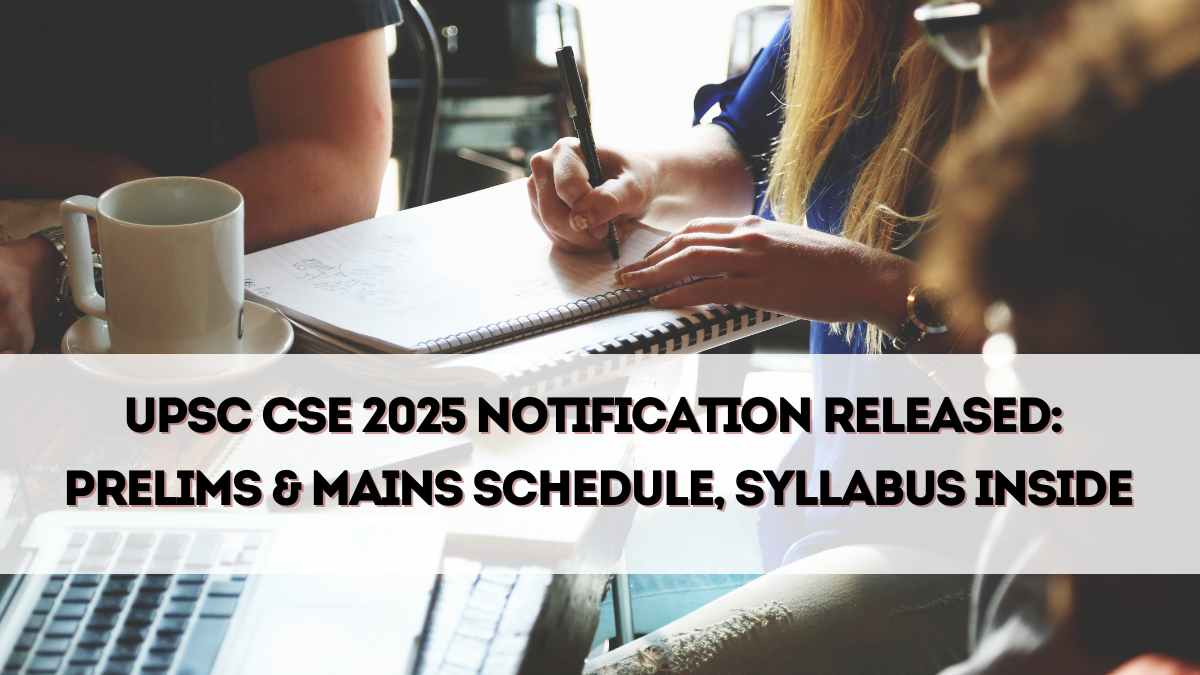The Union Public Service Commission (UPSC) has officially released the UPSC CSE 2025 Notification Out, creating excitement and urgency among lakhs of aspirants preparing for India’s most prestigious competitive exam. The Civil Services Examination (CSE) remains the ultimate gateway to coveted posts like the Indian Administrative Service (IAS), Indian Police Service (IPS), Indian Foreign Service (IFS), and several other Group A and B services. With the 2025 notification, UPSC has confirmed exam dates, eligibility details, and syllabus guidelines, helping aspirants streamline their preparation.

Importance of UPSC CSE in India
The UPSC CSE is not just another competitive exam; it is considered the toughest and most prestigious exam in India. Every year, over 10 lakh candidates apply, but only a few hundred make it to the final list. The exam tests not just knowledge, but also perseverance, decision-making skills, and analytical ability. Success in UPSC opens the door to:
-
High-ranking administrative posts.
-
Opportunities to shape government policies.
-
Social recognition and immense prestige.
-
A stable and rewarding career in public service.
The 2025 notification once again emphasizes UPSC’s commitment to selecting the best talent for India’s governance.
UPSC CSE 2025 Key Dates
The official notification provides the full exam schedule:
-
Release of Notification: January 2025
-
Application Start Date: Same day as notification release
-
Last Date to Apply: February 2025
-
UPSC Prelims Exam: June 2025
-
UPSC Mains Exam: September 2025
-
Interview/Personality Test: Early 2026
-
Final Results: Mid-2026
Candidates must keep track of deadlines carefully since late applications are not accepted.
UPSC CSE 2025 Eligibility Criteria
The notification outlines detailed eligibility norms:
-
Nationality: Candidates must be Indian citizens for IAS and IPS, while certain posts allow citizens of other countries under specified conditions.
-
Educational Qualification: A graduate degree from a recognized university is mandatory.
-
Age Limit: 21–32 years (as of August 1, 2025), with relaxations for SC, ST, OBC, and PwD candidates.
-
Number of Attempts: General category – 6 attempts; OBC – 9 attempts; SC/ST – unlimited till age limit.
These criteria remain similar to previous years, ensuring consistency for aspirants.
UPSC CSE 2025 Exam Pattern
The UPSC CSE is conducted in three rigorous stages:
-
Preliminary Examination
-
Consists of two papers: General Studies (GS) and Civil Services Aptitude Test (CSAT).
-
Both are objective-type papers.
-
GS focuses on history, polity, economics, environment, and current affairs.
-
CSAT evaluates logical reasoning, comprehension, and quantitative aptitude.
-
The Prelims is qualifying in nature.
-
-
Mains Examination
-
Consists of 9 descriptive papers.
-
Includes Essay, four GS papers, two optional subject papers, and two qualifying language papers.
-
Tests analytical and writing skills in depth.
-
-
Personality Test (Interview)
-
Candidates shortlisted from Mains face an interview panel.
-
Evaluates communication, confidence, decision-making, and overall personality.
-
This three-stage structure makes it one of the most comprehensive examinations globally.
UPSC CSE 2025 Syllabus Overview
The syllabus remains vast but is structured to test knowledge across diverse areas:
-
Prelims GS Paper I: Indian polity, history, economy, geography, environment, current affairs, and general science.
-
Prelims CSAT: Reasoning, mental ability, comprehension, and basic mathematics.
-
Mains GS Papers: Cover governance, ethics, society, technology, environment, and world issues.
-
Optional Subjects: Candidates choose from 48 subjects including literature, law, public administration, geography, and sociology.
-
Essay Paper: Requires analytical writing on contemporary topics.
Mastering the syllabus requires years of preparation and consistency.
How to Apply for UPSC CSE 2025
The application process is fully online:
-
Visit the official UPSC website (upsconline.nic.in).
-
Register with basic details including email and mobile number.
-
Fill in the detailed application form with educational and personal information.
-
Upload documents such as photo, signature, and ID proof.
-
Pay the application fee (₹100 for general/OBC, exempted for SC/ST/PwD).
-
Download and save the application confirmation.
Applicants must ensure accuracy, as incorrect details may lead to disqualification later.
Preparation Strategy for UPSC CSE 2025
Given the competition, aspirants need a smart and disciplined strategy:
-
NCERT Books First: Foundation in history, polity, economics, and geography must be strong.
-
Daily Current Affairs: Regularly read newspapers like The Hindu or Indian Express and monthly magazines.
-
Optional Subject Mastery: Choose a subject based on interest and scoring potential.
-
Answer Writing Practice: Daily writing improves clarity and speed for Mains.
-
Mock Tests: Essential for both Prelims and Mains.
-
Consistency: A minimum of 8–10 hours of study daily is required.
Early preparation is key to cracking UPSC on the first attempt.
Benefits of Clearing UPSC CSE
Qualifying in the Civil Services Exam opens up unmatched opportunities:
-
IAS officers shape public policy and administration.
-
IPS officers safeguard law and order.
-
IFS officers represent India globally.
-
High job security with excellent salary and perks.
-
Social respect and the ability to make real change in society.
This explains why UPSC is considered the “dream exam” for many Indian graduates.
FAQs
When will UPSC CSE 2025 prelims be held?
The Prelims exam will be conducted in June 2025.
How many attempts are allowed for UPSC CSE?
General category candidates can attempt 6 times, OBC 9 times, and SC/ST candidates have unlimited attempts until the age limit.
What is the age limit for UPSC CSE 2025?
The age limit is 21–32 years as of August 1, 2025, with relaxations for reserved categories.
Is CSAT compulsory in Prelims?
Yes, CSAT is compulsory, though it is qualifying in nature and requires minimum marks.
Which optional subject is best for UPSC?
Subjects like Public Administration, Sociology, Geography, and Literature are popular due to their scoring potential and overlap with GS papers.
Click here to know more.
